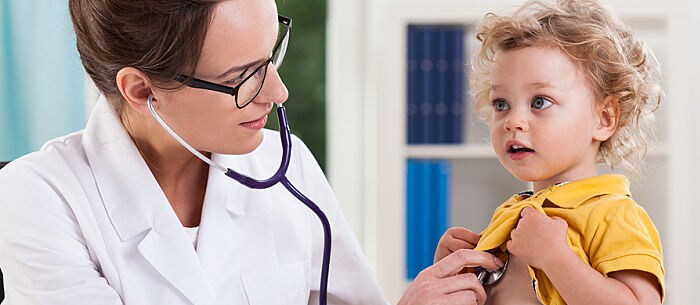When your toddler gets a bout of diarrhea, sometimes it’s scary not knowing what to do. Should you just keep an eye on the situation at home or seek medical attention fast? Here’s what you need to know.
Diarrhea in toddlers, characterized by loose stools, is fairly common. Young children get an average of two episodes of acute diarrhea (lasting for one or two days) each year, reports the National Institute of Diabetes and Digestive and Kidney Diseases.
Here are answers to 5 frequently asked questions about this common childhood occurrence.
- Why Do Toddlers Get Diarrhea?
“Diarrhea is the body’s natural attempt to get rid of something unwanted,” says Dr. Ashanti W. Woods, an attending pediatrician at Mercy Medical Center in Baltimore and a junior fellow with the American Academy of Pediatrics. Diarrhea can be infectious or noninfectious. Infectious diarrhea includes two types: bacterial and viral. Bacterial can be from food poisoning caused by salmonella or shigella, which sometimes pops up in day care.Viral diarrhea is the most common type and results from “ingestion of a virus, frequently from touching a contaminated surface or toy and then putting the hand in the mouth,” says Dr. Woods. Being near an uncovered sneeze or cough from a playmate with a virus also causes viral diarrhea. Diet can play a role, too. Noninfectious diarrhea (also called osmotic diarrhea) is from too much sugar or from a food allergy, possibly to dairy products, Dr. Woods explains.
- How Can You Treat It At Home?
“Diarrhea is the most common cause of dehydration in young children and babies,” says Dr. Eduardo Dolhun, a Mayo Clinic-trained family physician, a founder of Doctors Outreach Clinics and a lecturer at Stanford University Medical School. “During an episode of diarrhea, a child loses water and electrolytes quickly,” notes Dr. Dolhun, so concentrate on replacing lost fluids in mild cases of diarrhea in toddlers.Give your toddler an “oral rehydration drink to help replenish vital nutrients and water,” says Dr. Dolhun. These come in liquid and popsicle forms and are sold in drugstores. Sports drinks, sodas and juices containing sugar can lead to osmotic diarrhea, says Dr. Woods, so while you want to offer a regular diet, avoid giving sweets during this time.
- What Happens If Diarrhea Is Left Untreated?
Your child could become dehydrated. “Treatment often includes letting the toddler fully eliminate his or her bowels to get rid of the toxins. The diarrhea is a good thing,” says Dr. Woods, adding that both bacterial and viral diarrhea “need to run their course.” But don’t ignore diarrhea. If the child is vomiting as well as passing loose stools, bring him to your pediatrician or the emergency room, instructs the U.S. Food and Drug Administration (FDA).
- When Should You Involve Your Pediatrician?
If you’re worried, call your pediatrician right away for advice. The FDA says take your child to the doctor if the diarrhea lasts more than 24 hours, is accompanied by a fever of 102 degrees or more, is producing black, tar-like stool or stool that contains blood, or if your toddler shows signs of dehydration — a dry tongue and mouth, crying but with no tears, a dry diaper for more than three hours, sunken eyes or cheeks, listlessness and fever.
- How Do You Help Your Child Cope?
Offer plenty of fluids and the child’s regular diet but in smaller portions throughout the day instead of three big meals, according to the National Institutes of Health (NIH). Some good options recommended by the NIH are baked and broiled beef, chicken and fish, which are better than fried or processed foods. Foods that can help diarrhea are bananas and potatoes without skin. Pretzels, crackers and soup are fine. Children with diarrhea can usually tolerate carrots and green beans, but don’t offer gassy foods such as broccoli, beans, peas and corn.
While you want to provide relief, don’t treat a toddler’s diarrhea with over-the-counter medications. These are geared for adults, and their ingredients contain magnesium, aluminum or bismuth, which are harmful to toddlers, according to the FDA. Above all, follow your pediatrician’s instructions. Deep breaths help, too!
Laura Agadoni is a mom and a parenting writer whose articles have appeared in various publications, such as “Modern Mom,” “The Penny Hoarder,” “Tom’s of Maine,” “Global Post” and “Livestrong.”
Think your little one may have something more serious? Read I Think My Child Has the Flu.
* This article is for general informational purposes only. It is not intended nor implied to be providing medical advice and is not a substitute for such advice. The reader should always consult a health care provider concerning any medical condition or treatment plan. Neither Care.com nor the author assumes any responsibility or liability with respect to use of any information contained herein.




